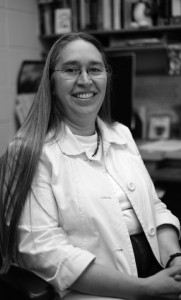
After talking to Professor of Biology and Environmental Studies Cindy Johnson-Groh about her experiences in the Tanzanian wilderness, the question is no longer, “Why would you leave your house and home to go to a place that doesn’t even have wireless internet?” Instead, it’s, “Why would you ever want to leave?”
Over the course of her seven trips to Tanzania, Cindy, who is also the executive director of the Linnaeus Arboretum, saw herds of wildebeests and packs of cheetahs. She had lions visit her campsite and saw termite mounds the size of a house.
“I’ve got such a love for the place, and I just want to expose students to this experience,” said Cindy.
Cindy has led a total of seven January Interim Experience trips with students to Tanzania to study culture, wildlife and ecology, and, thanks to the Fulbright grant she recently received, she will be leading another trip in January of 2011.
Some of the most amazing experiences of past groups involved interactions with people from the indigenous tribes in the Tanzanian region. Cindy’s students are always treated to a goat roast on each of their excursions, an indigenous dish that doesn’t need much in the way of explanation. These people, most of them from the Massai tribe, live as hunter-gatherers and are so separate from the “Western” world that many things that we see everyday completely blow their minds.
“One of the things the men of the tribe do to prove their manhood is to kill a lion,” said Cindy, referring to one of the many pictures she has collected during her Tanzanian trips. This one shows a group of about twelve tribe members carrying severed paws and organs from a defeated animal on the tips of their spears.
Fulbright grants are awarded to a total of 1,100 college professors nationwide who plan on traveling abroad for research purposes. Cindy, a recent recipient of this prestigious scholarship, will be using her trip to Tanzania to teach students and to write a new book about the ecology and conservation of the region. The book will be used in her courses as well as other biology courses at Gustavus. It will have a special focus on the interactions of indigenous people and Western inhabitants on the region’s ecological structure.
“For example, in modern Tanzania there are lots and lots of people with small farms. Before it wasn’t a problem, but now there are herds of elephants that need to move through those farms on their way to find water. … I want to put all this together in a story so people can understand and compare history and the modern system [in Tanzania],” said Cindy.
Although the courses she teaches in Minnesota don’t usually involve jungle animals and exotic locations, those who know Cindy know how she can infect students with the same excitement she feels about observing the natural world.
“She knows a lot about her field of study, and she is always willing to incorporate students into side projects,” said First-year Biology Major Matt Martin. “She makes it fun for students to talk about plants.”
“Cindy’s ardor for creation … blesses the Gustavus campus and beyond. Her compassionate and gracious support encourages us to find our own niches in our time here and elsewhere,” said Becca Hohag, a first-year philosophy major.
“She goes above and beyond just being a professor. She’s a mentor and a friend,” said Junior Biology Major Keisha Bates.
As long as Cindy decides to remain in the comparatively serene midwestern United States, she will continue to inspire students who are interested in studying the natural world with her passion, knowledge and incredible experiences.
Any students who are interested in joining Cindy on her 2011 trip should attend the informational session on Thursday, May 21 from 1:30 p.m. to 2:30 p.m. in the Nobel Auditorium. Students can also contact Cindy via e-mail at cjgroh@gustavus.edu.
It’s nice reading your blog. thanks for the share!